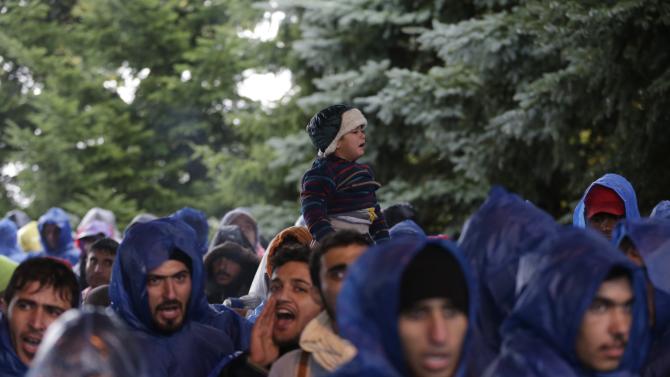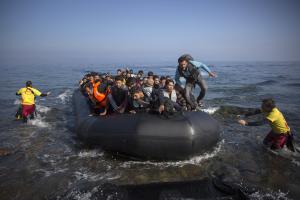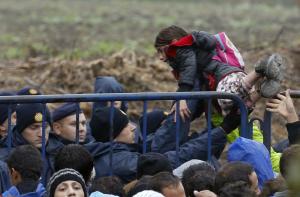Date: Mon, 19 Oct 2015 16:09:05 +0200
By AMER COHADZIC
TRNOVEC, Croatia (AP) — The tide of asylum seekers along Europe's newest migration route swelled to treacherous new levels Monday as many thousands struggled to clear human bottlenecks in the West Balkans, where government leaders blamed their neighbors for making a bad situation worse.
Croatia sent at least two trains and several buses filled with people fleeing war and poverty north to the border with Slovenia, where officials accused the Croats of breaking previous agreements to limit such transfers to 2,500 people a day.
Croatian officials insisted no such binding deal could be enforced because they lacked legal powers to confine travelers to Croat emergency shelters.
When the first train containing an estimated 1,800 people stopped near Slovenia shortly after midnight, people found their path blocked in both directions by rival deployments of Croat and Slovene police, each arguing that the trekkers must seek shelter in the opposite direction.
This created an effective no-man's land on the border and forced many to spend the night stuck in the open and struggling to sleep amid bitter cold, driving rain and wailing children. Some travelers piled up soggy tree branches for fires. Border officials at another crossing point braced for a second train with an estimated 1,900 aboard due Monday night.
"It's completely unacceptable," said Slovene Interior Minister Vesna Gyorkos Znidar, who accused Croatia of ignoring Slovenian appeals and of seeking to dump "an unlimited number of immigrants" on Slovenia rather than make proactive efforts to coax thousands into staying at Croatian shelters.
But Croatia retorted that it, too, was being unfairly burdened by unrelenting flows from Serbia, where an estimated 4,000 people were waiting Monday in similarly miserable conditions on the Serbo-Croat border.
UNHCR spokeswoman Melita Sunjic, who is at the Serbia-Croatia border, told The Associated Press that the U.N. refugee agency estimates there are more than 10,000 migrants in Serbia — which represents more than double the daily average in the past month.
There, police have erected steel gates at the most popular crossings to slow the flow. Some families, desperate to get their children out of the cold and rain, could be seen handing small boys and girls over the security barriers to police. Many others fed up with waiting in the rain tried to outflank police positions, walking through orchards and cornfields, stumbling in the mud along the way.
"We are in cold weather and the place is not good," said Farouk al-Hatib, a Syrian who was waiting for Croat police to allow him to cross from Serbia. "Our message for the governments is to take into consideration our suffering."
Croatian government leaders argue that it is pointless, if not impossible, to stop people who overwhelmingly express determination to reach wealthier, more liberal nations in Western Europe, chiefly Germany.
"The Republic of Croatia has asked these refugees to stay at our reception centers until their status is resolved, but they all refuse it," said Matija Posavec, governor of Medjimurje, Croatia's northernmost county bordering Slovenia. "They could have stayed on board the train. They could have stayed at the reception centers, but none of them really wants that. ... They just want to pass."
Slovenia did gradually admit Monday's new border arrivals, leaving just 500 from the overnight train still waiting in the rain by the afternoon.
The humanitarian crisis on Slovenia's southern border has grown since Saturday, when Hungary closed its border with Croatia.
Hungary — for months the most popular route for asylum seekers seeking an eastern entry point to the European Union — in mid-September already had stopped people from crossing on foot from Serbia, forcing the travelers from the Middle East, Asia and Africa to look further west in the Balkans for a new path through to Austria and Germany.
___
Associated Press reporters Dusan Stojanovic and Jovana Gec in Belgrade, Serbia, Ali Zerdin in Ljubljana, Slovenia, and Radul Radovanovic, Sabina Niksic and Ivana Bzganovic on the Croatia-Serbia border contributed to this report.
___
This story has been corrected to show that the dateline is TRNOVEC, Croatia, not TRNOVEC, Slovenia.


